Research Project: Motivations Behind Dark Tourism in Highgate Cemetery
VerifiedAdded on 2023/06/11
|9
|1554
|446
Report
AI Summary
This research proposal explores the motivations behind dark tourism, specifically focusing on Highgate Cemetery in London. The study aims to identify the factors influencing individuals' interest in visiting sites associated with death, misfortune, and suffering. The research objectives include depicting the relationship between age and frequency of visits to Highgate Cemetery, understanding the correlation between age, employment status, relationship status, and attraction to dark tourism, and investigating the impact of death and relationship status on the frequency of visiting dark tourism sites. The proposal outlines the research questions, hypotheses, required resources, and the research methods and tools to be used, including a survey of 50 respondents who have visited Highgate Cemetery. It also addresses potential issues anticipated during the research project and provides a timeline for conducting the project. Desklib provides access to similar research materials and solved assignments for students.
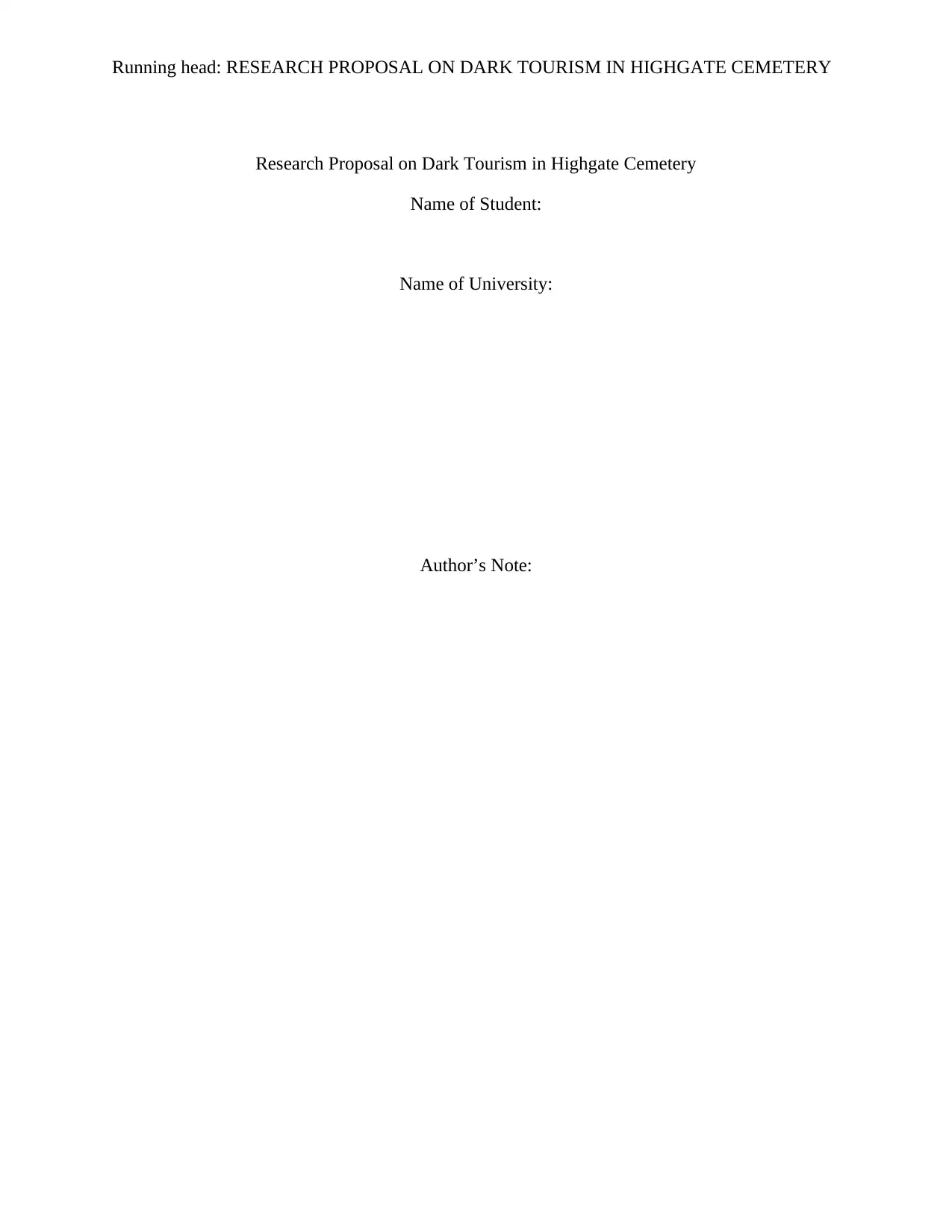
Running head: RESEARCH PROPOSAL ON DARK TOURISM IN HIGHGATE CEMETERY
Research Proposal on Dark Tourism in Highgate Cemetery
Name of Student:
Name of University:
Author’s Note:
Research Proposal on Dark Tourism in Highgate Cemetery
Name of Student:
Name of University:
Author’s Note:
Paraphrase This Document
Need a fresh take? Get an instant paraphrase of this document with our AI Paraphraser
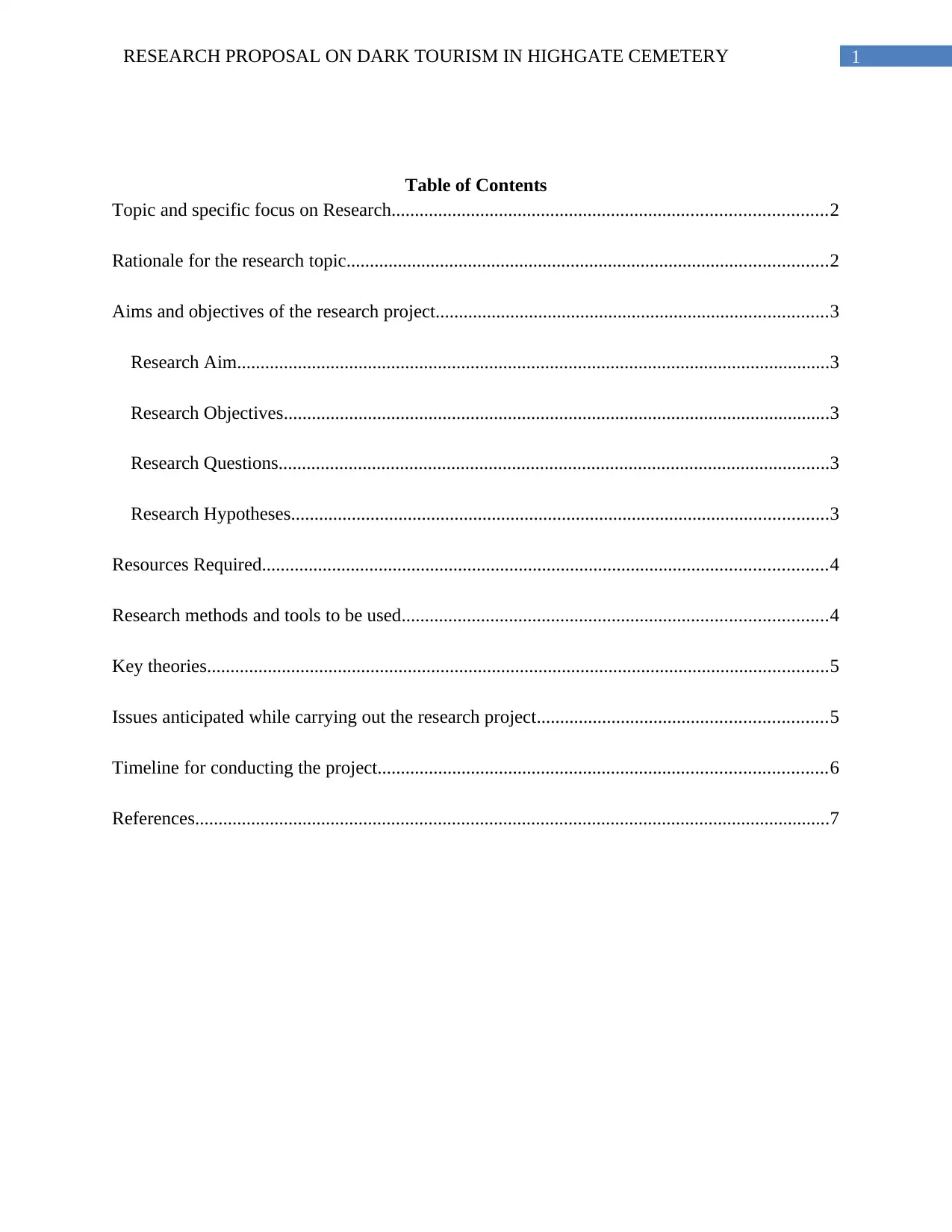
1RESEARCH PROPOSAL ON DARK TOURISM IN HIGHGATE CEMETERY
Table of Contents
Topic and specific focus on Research.............................................................................................2
Rationale for the research topic.......................................................................................................2
Aims and objectives of the research project....................................................................................3
Research Aim...............................................................................................................................3
Research Objectives.....................................................................................................................3
Research Questions......................................................................................................................3
Research Hypotheses...................................................................................................................3
Resources Required.........................................................................................................................4
Research methods and tools to be used...........................................................................................4
Key theories.....................................................................................................................................5
Issues anticipated while carrying out the research project..............................................................5
Timeline for conducting the project................................................................................................6
References........................................................................................................................................7
Table of Contents
Topic and specific focus on Research.............................................................................................2
Rationale for the research topic.......................................................................................................2
Aims and objectives of the research project....................................................................................3
Research Aim...............................................................................................................................3
Research Objectives.....................................................................................................................3
Research Questions......................................................................................................................3
Research Hypotheses...................................................................................................................3
Resources Required.........................................................................................................................4
Research methods and tools to be used...........................................................................................4
Key theories.....................................................................................................................................5
Issues anticipated while carrying out the research project..............................................................5
Timeline for conducting the project................................................................................................6
References........................................................................................................................................7
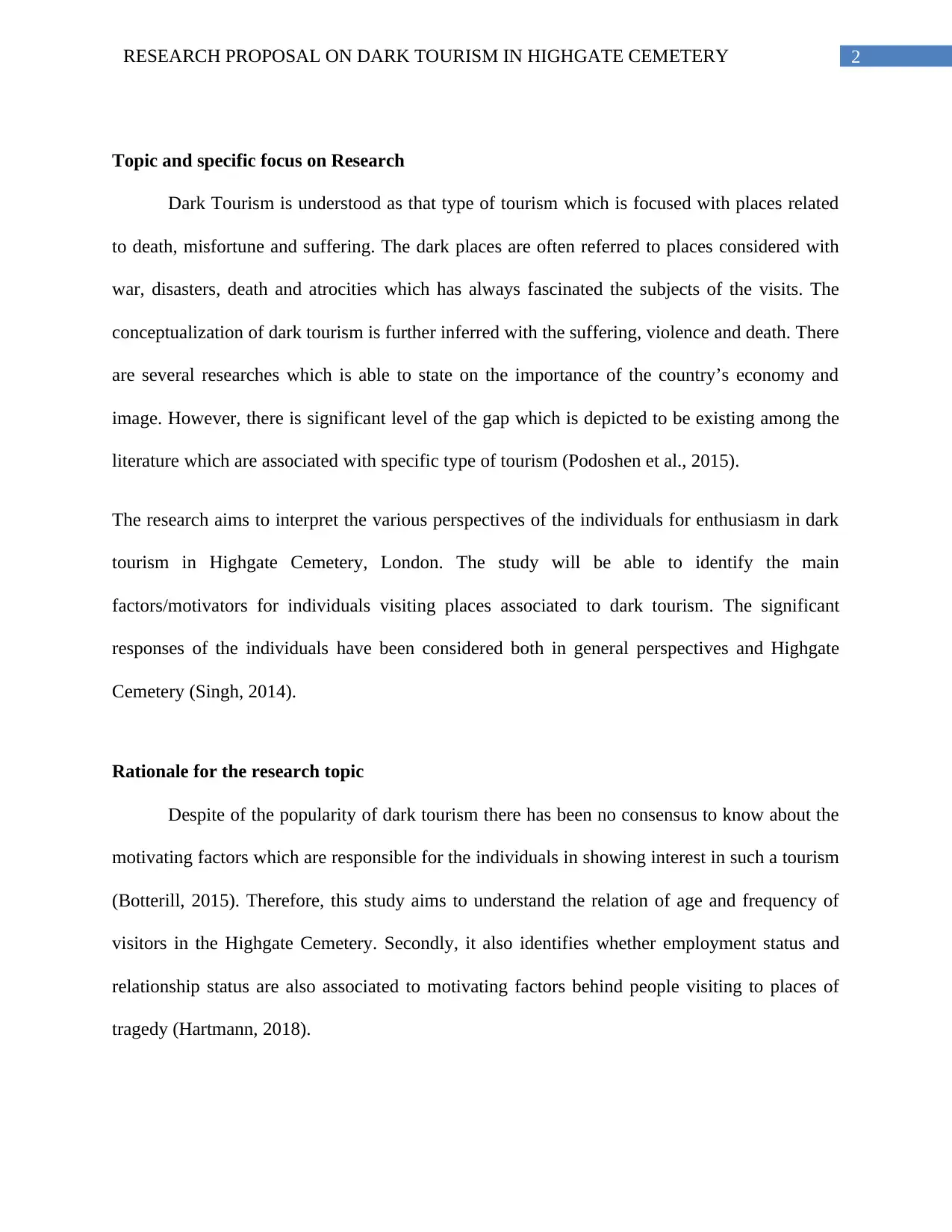
2RESEARCH PROPOSAL ON DARK TOURISM IN HIGHGATE CEMETERY
Topic and specific focus on Research
Dark Tourism is understood as that type of tourism which is focused with places related
to death, misfortune and suffering. The dark places are often referred to places considered with
war, disasters, death and atrocities which has always fascinated the subjects of the visits. The
conceptualization of dark tourism is further inferred with the suffering, violence and death. There
are several researches which is able to state on the importance of the country’s economy and
image. However, there is significant level of the gap which is depicted to be existing among the
literature which are associated with specific type of tourism (Podoshen et al., 2015).
The research aims to interpret the various perspectives of the individuals for enthusiasm in dark
tourism in Highgate Cemetery, London. The study will be able to identify the main
factors/motivators for individuals visiting places associated to dark tourism. The significant
responses of the individuals have been considered both in general perspectives and Highgate
Cemetery (Singh, 2014).
Rationale for the research topic
Despite of the popularity of dark tourism there has been no consensus to know about the
motivating factors which are responsible for the individuals in showing interest in such a tourism
(Botterill, 2015). Therefore, this study aims to understand the relation of age and frequency of
visitors in the Highgate Cemetery. Secondly, it also identifies whether employment status and
relationship status are also associated to motivating factors behind people visiting to places of
tragedy (Hartmann, 2018).
Topic and specific focus on Research
Dark Tourism is understood as that type of tourism which is focused with places related
to death, misfortune and suffering. The dark places are often referred to places considered with
war, disasters, death and atrocities which has always fascinated the subjects of the visits. The
conceptualization of dark tourism is further inferred with the suffering, violence and death. There
are several researches which is able to state on the importance of the country’s economy and
image. However, there is significant level of the gap which is depicted to be existing among the
literature which are associated with specific type of tourism (Podoshen et al., 2015).
The research aims to interpret the various perspectives of the individuals for enthusiasm in dark
tourism in Highgate Cemetery, London. The study will be able to identify the main
factors/motivators for individuals visiting places associated to dark tourism. The significant
responses of the individuals have been considered both in general perspectives and Highgate
Cemetery (Singh, 2014).
Rationale for the research topic
Despite of the popularity of dark tourism there has been no consensus to know about the
motivating factors which are responsible for the individuals in showing interest in such a tourism
(Botterill, 2015). Therefore, this study aims to understand the relation of age and frequency of
visitors in the Highgate Cemetery. Secondly, it also identifies whether employment status and
relationship status are also associated to motivating factors behind people visiting to places of
tragedy (Hartmann, 2018).
⊘ This is a preview!⊘
Do you want full access?
Subscribe today to unlock all pages.

Trusted by 1+ million students worldwide
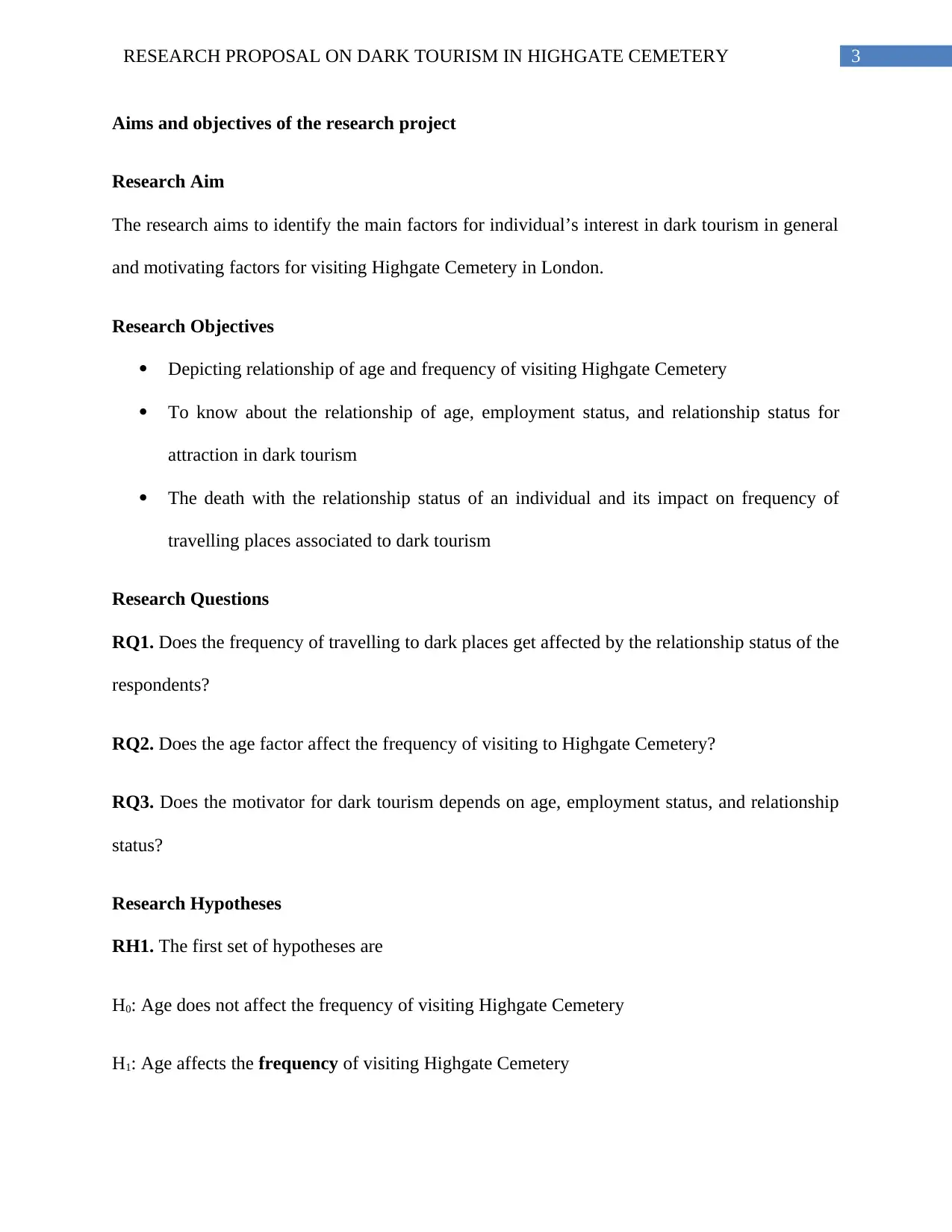
3RESEARCH PROPOSAL ON DARK TOURISM IN HIGHGATE CEMETERY
Aims and objectives of the research project
Research Aim
The research aims to identify the main factors for individual’s interest in dark tourism in general
and motivating factors for visiting Highgate Cemetery in London.
Research Objectives
Depicting relationship of age and frequency of visiting Highgate Cemetery
To know about the relationship of age, employment status, and relationship status for
attraction in dark tourism
The death with the relationship status of an individual and its impact on frequency of
travelling places associated to dark tourism
Research Questions
RQ1. Does the frequency of travelling to dark places get affected by the relationship status of the
respondents?
RQ2. Does the age factor affect the frequency of visiting to Highgate Cemetery?
RQ3. Does the motivator for dark tourism depends on age, employment status, and relationship
status?
Research Hypotheses
RH1. The first set of hypotheses are
H0: Age does not affect the frequency of visiting Highgate Cemetery
H1: Age affects the frequency of visiting Highgate Cemetery
Aims and objectives of the research project
Research Aim
The research aims to identify the main factors for individual’s interest in dark tourism in general
and motivating factors for visiting Highgate Cemetery in London.
Research Objectives
Depicting relationship of age and frequency of visiting Highgate Cemetery
To know about the relationship of age, employment status, and relationship status for
attraction in dark tourism
The death with the relationship status of an individual and its impact on frequency of
travelling places associated to dark tourism
Research Questions
RQ1. Does the frequency of travelling to dark places get affected by the relationship status of the
respondents?
RQ2. Does the age factor affect the frequency of visiting to Highgate Cemetery?
RQ3. Does the motivator for dark tourism depends on age, employment status, and relationship
status?
Research Hypotheses
RH1. The first set of hypotheses are
H0: Age does not affect the frequency of visiting Highgate Cemetery
H1: Age affects the frequency of visiting Highgate Cemetery
Paraphrase This Document
Need a fresh take? Get an instant paraphrase of this document with our AI Paraphraser
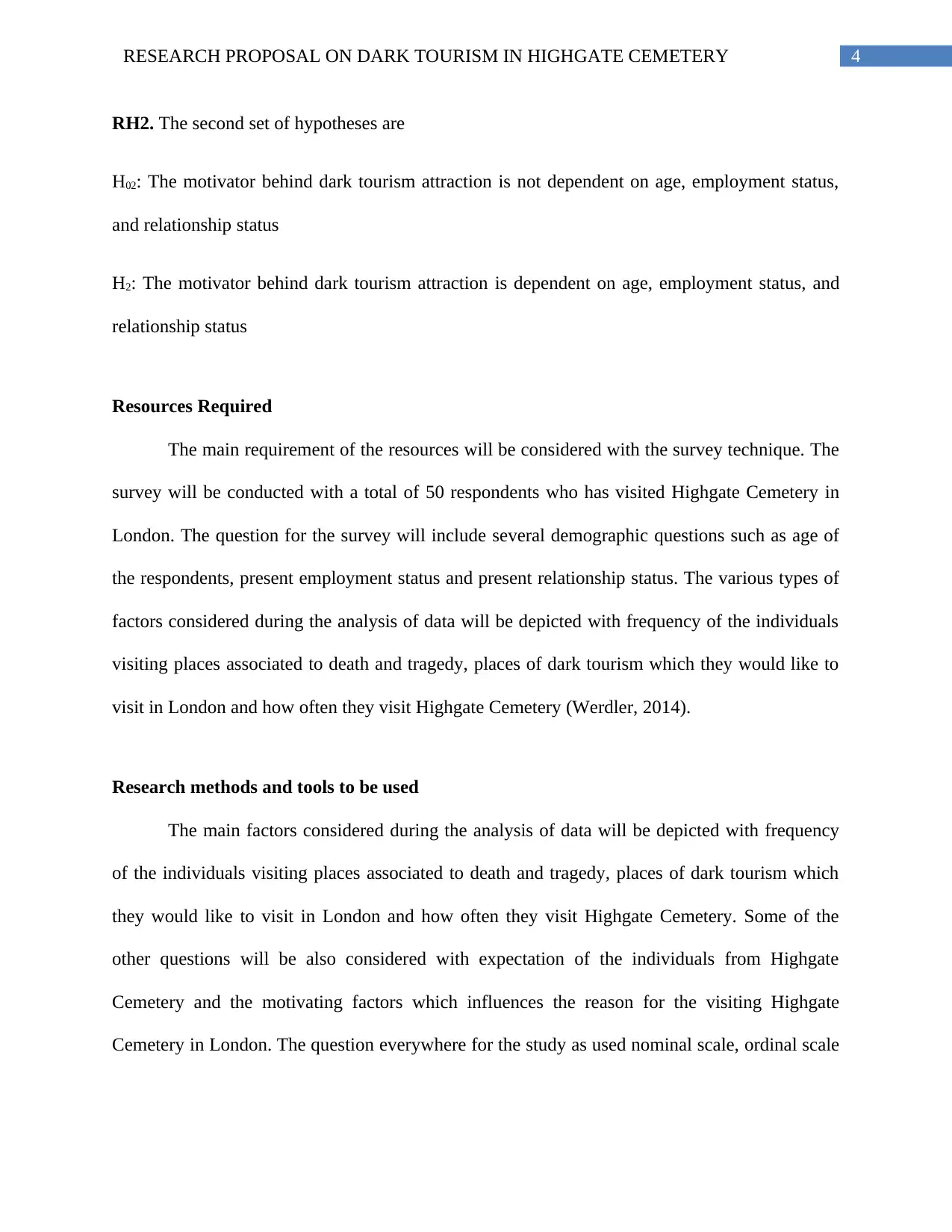
4RESEARCH PROPOSAL ON DARK TOURISM IN HIGHGATE CEMETERY
RH2. The second set of hypotheses are
H02: The motivator behind dark tourism attraction is not dependent on age, employment status,
and relationship status
H2: The motivator behind dark tourism attraction is dependent on age, employment status, and
relationship status
Resources Required
The main requirement of the resources will be considered with the survey technique. The
survey will be conducted with a total of 50 respondents who has visited Highgate Cemetery in
London. The question for the survey will include several demographic questions such as age of
the respondents, present employment status and present relationship status. The various types of
factors considered during the analysis of data will be depicted with frequency of the individuals
visiting places associated to death and tragedy, places of dark tourism which they would like to
visit in London and how often they visit Highgate Cemetery (Werdler, 2014).
Research methods and tools to be used
The main factors considered during the analysis of data will be depicted with frequency
of the individuals visiting places associated to death and tragedy, places of dark tourism which
they would like to visit in London and how often they visit Highgate Cemetery. Some of the
other questions will be also considered with expectation of the individuals from Highgate
Cemetery and the motivating factors which influences the reason for the visiting Highgate
Cemetery in London. The question everywhere for the study as used nominal scale, ordinal scale
RH2. The second set of hypotheses are
H02: The motivator behind dark tourism attraction is not dependent on age, employment status,
and relationship status
H2: The motivator behind dark tourism attraction is dependent on age, employment status, and
relationship status
Resources Required
The main requirement of the resources will be considered with the survey technique. The
survey will be conducted with a total of 50 respondents who has visited Highgate Cemetery in
London. The question for the survey will include several demographic questions such as age of
the respondents, present employment status and present relationship status. The various types of
factors considered during the analysis of data will be depicted with frequency of the individuals
visiting places associated to death and tragedy, places of dark tourism which they would like to
visit in London and how often they visit Highgate Cemetery (Werdler, 2014).
Research methods and tools to be used
The main factors considered during the analysis of data will be depicted with frequency
of the individuals visiting places associated to death and tragedy, places of dark tourism which
they would like to visit in London and how often they visit Highgate Cemetery. Some of the
other questions will be also considered with expectation of the individuals from Highgate
Cemetery and the motivating factors which influences the reason for the visiting Highgate
Cemetery in London. The question everywhere for the study as used nominal scale, ordinal scale
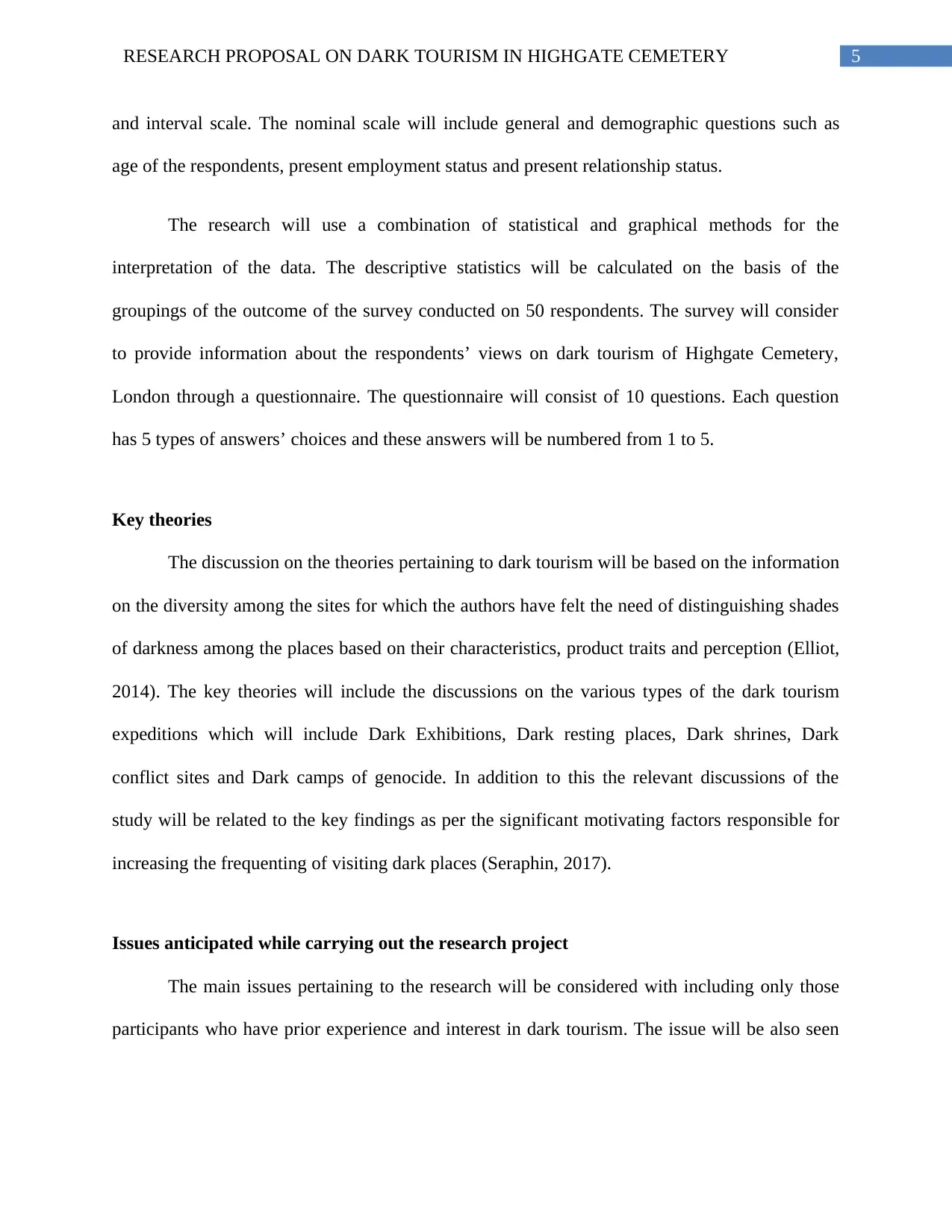
5RESEARCH PROPOSAL ON DARK TOURISM IN HIGHGATE CEMETERY
and interval scale. The nominal scale will include general and demographic questions such as
age of the respondents, present employment status and present relationship status.
The research will use a combination of statistical and graphical methods for the
interpretation of the data. The descriptive statistics will be calculated on the basis of the
groupings of the outcome of the survey conducted on 50 respondents. The survey will consider
to provide information about the respondents’ views on dark tourism of Highgate Cemetery,
London through a questionnaire. The questionnaire will consist of 10 questions. Each question
has 5 types of answers’ choices and these answers will be numbered from 1 to 5.
Key theories
The discussion on the theories pertaining to dark tourism will be based on the information
on the diversity among the sites for which the authors have felt the need of distinguishing shades
of darkness among the places based on their characteristics, product traits and perception (Elliot,
2014). The key theories will include the discussions on the various types of the dark tourism
expeditions which will include Dark Exhibitions, Dark resting places, Dark shrines, Dark
conflict sites and Dark camps of genocide. In addition to this the relevant discussions of the
study will be related to the key findings as per the significant motivating factors responsible for
increasing the frequenting of visiting dark places (Seraphin, 2017).
Issues anticipated while carrying out the research project
The main issues pertaining to the research will be considered with including only those
participants who have prior experience and interest in dark tourism. The issue will be also seen
and interval scale. The nominal scale will include general and demographic questions such as
age of the respondents, present employment status and present relationship status.
The research will use a combination of statistical and graphical methods for the
interpretation of the data. The descriptive statistics will be calculated on the basis of the
groupings of the outcome of the survey conducted on 50 respondents. The survey will consider
to provide information about the respondents’ views on dark tourism of Highgate Cemetery,
London through a questionnaire. The questionnaire will consist of 10 questions. Each question
has 5 types of answers’ choices and these answers will be numbered from 1 to 5.
Key theories
The discussion on the theories pertaining to dark tourism will be based on the information
on the diversity among the sites for which the authors have felt the need of distinguishing shades
of darkness among the places based on their characteristics, product traits and perception (Elliot,
2014). The key theories will include the discussions on the various types of the dark tourism
expeditions which will include Dark Exhibitions, Dark resting places, Dark shrines, Dark
conflict sites and Dark camps of genocide. In addition to this the relevant discussions of the
study will be related to the key findings as per the significant motivating factors responsible for
increasing the frequenting of visiting dark places (Seraphin, 2017).
Issues anticipated while carrying out the research project
The main issues pertaining to the research will be considered with including only those
participants who have prior experience and interest in dark tourism. The issue will be also seen
⊘ This is a preview!⊘
Do you want full access?
Subscribe today to unlock all pages.

Trusted by 1+ million students worldwide
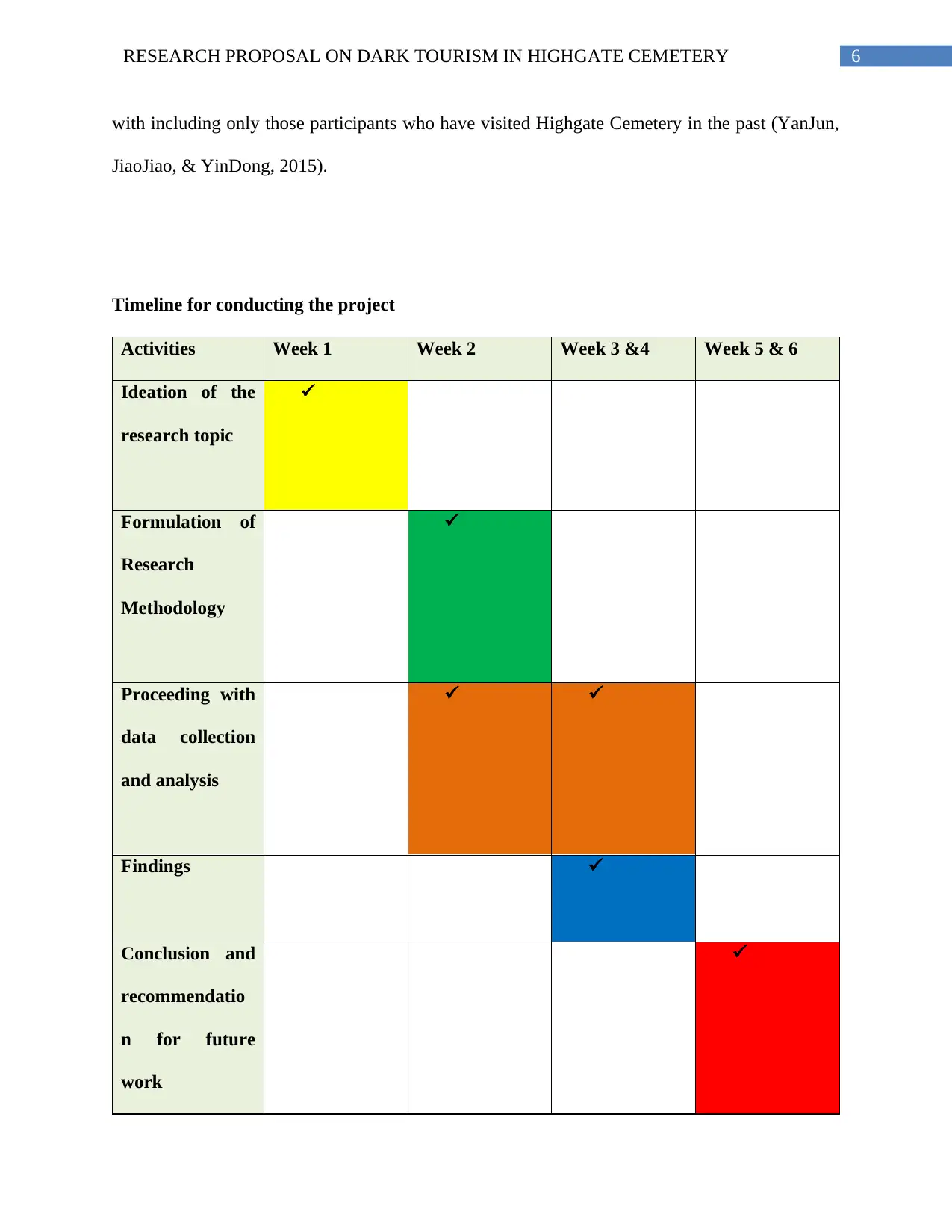
6RESEARCH PROPOSAL ON DARK TOURISM IN HIGHGATE CEMETERY
with including only those participants who have visited Highgate Cemetery in the past (YanJun,
JiaoJiao, & YinDong, 2015).
Timeline for conducting the project
Activities Week 1 Week 2 Week 3 &4 Week 5 & 6
Ideation of the
research topic
Formulation of
Research
Methodology
Proceeding with
data collection
and analysis
Findings
Conclusion and
recommendatio
n for future
work
with including only those participants who have visited Highgate Cemetery in the past (YanJun,
JiaoJiao, & YinDong, 2015).
Timeline for conducting the project
Activities Week 1 Week 2 Week 3 &4 Week 5 & 6
Ideation of the
research topic
Formulation of
Research
Methodology
Proceeding with
data collection
and analysis
Findings
Conclusion and
recommendatio
n for future
work
Paraphrase This Document
Need a fresh take? Get an instant paraphrase of this document with our AI Paraphraser
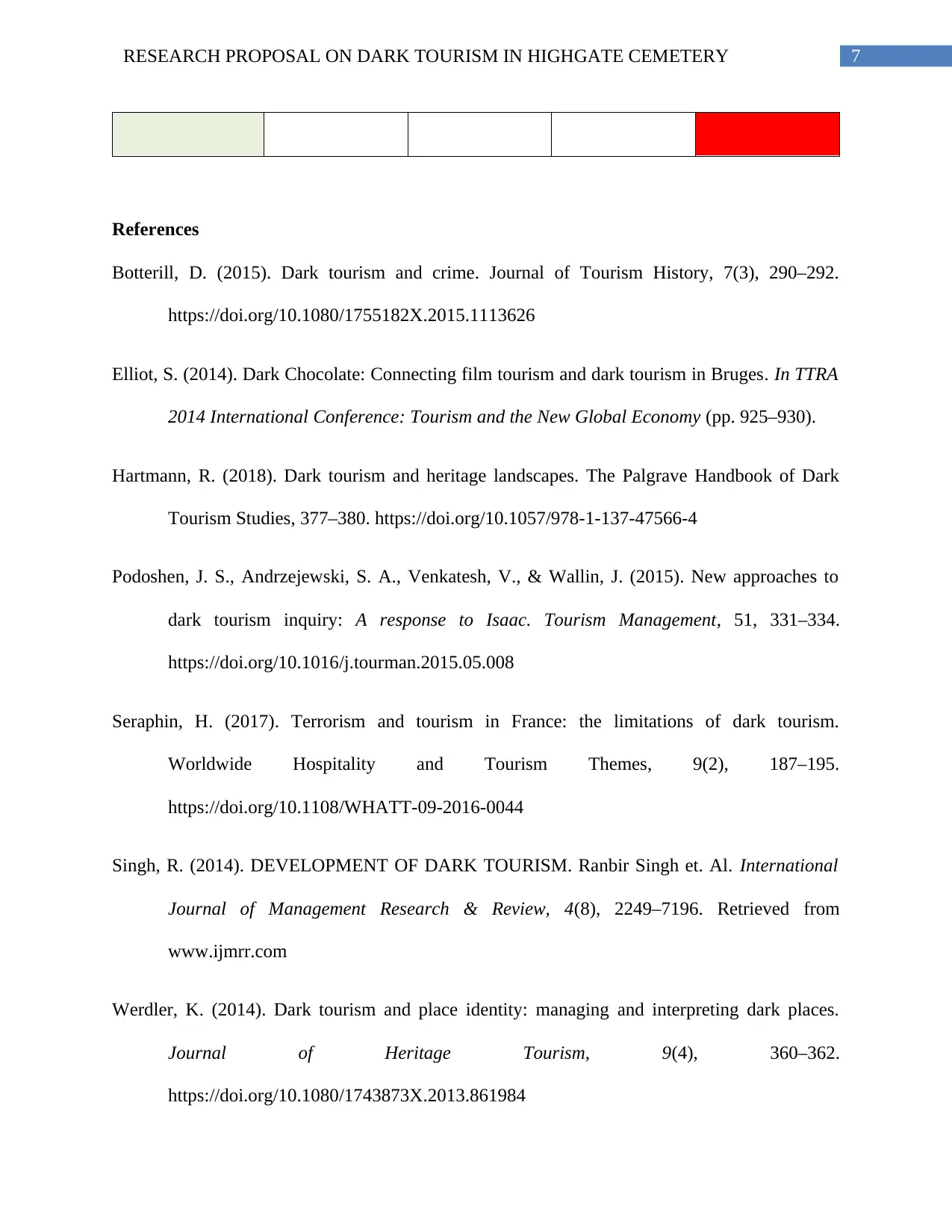
7RESEARCH PROPOSAL ON DARK TOURISM IN HIGHGATE CEMETERY
References
Botterill, D. (2015). Dark tourism and crime. Journal of Tourism History, 7(3), 290–292.
https://doi.org/10.1080/1755182X.2015.1113626
Elliot, S. (2014). Dark Chocolate: Connecting film tourism and dark tourism in Bruges. In TTRA
2014 International Conference: Tourism and the New Global Economy (pp. 925–930).
Hartmann, R. (2018). Dark tourism and heritage landscapes. The Palgrave Handbook of Dark
Tourism Studies, 377–380. https://doi.org/10.1057/978-1-137-47566-4
Podoshen, J. S., Andrzejewski, S. A., Venkatesh, V., & Wallin, J. (2015). New approaches to
dark tourism inquiry: A response to Isaac. Tourism Management, 51, 331–334.
https://doi.org/10.1016/j.tourman.2015.05.008
Seraphin, H. (2017). Terrorism and tourism in France: the limitations of dark tourism.
Worldwide Hospitality and Tourism Themes, 9(2), 187–195.
https://doi.org/10.1108/WHATT-09-2016-0044
Singh, R. (2014). DEVELOPMENT OF DARK TOURISM. Ranbir Singh et. Al. International
Journal of Management Research & Review, 4(8), 2249–7196. Retrieved from
www.ijmrr.com
Werdler, K. (2014). Dark tourism and place identity: managing and interpreting dark places.
Journal of Heritage Tourism, 9(4), 360–362.
https://doi.org/10.1080/1743873X.2013.861984
References
Botterill, D. (2015). Dark tourism and crime. Journal of Tourism History, 7(3), 290–292.
https://doi.org/10.1080/1755182X.2015.1113626
Elliot, S. (2014). Dark Chocolate: Connecting film tourism and dark tourism in Bruges. In TTRA
2014 International Conference: Tourism and the New Global Economy (pp. 925–930).
Hartmann, R. (2018). Dark tourism and heritage landscapes. The Palgrave Handbook of Dark
Tourism Studies, 377–380. https://doi.org/10.1057/978-1-137-47566-4
Podoshen, J. S., Andrzejewski, S. A., Venkatesh, V., & Wallin, J. (2015). New approaches to
dark tourism inquiry: A response to Isaac. Tourism Management, 51, 331–334.
https://doi.org/10.1016/j.tourman.2015.05.008
Seraphin, H. (2017). Terrorism and tourism in France: the limitations of dark tourism.
Worldwide Hospitality and Tourism Themes, 9(2), 187–195.
https://doi.org/10.1108/WHATT-09-2016-0044
Singh, R. (2014). DEVELOPMENT OF DARK TOURISM. Ranbir Singh et. Al. International
Journal of Management Research & Review, 4(8), 2249–7196. Retrieved from
www.ijmrr.com
Werdler, K. (2014). Dark tourism and place identity: managing and interpreting dark places.
Journal of Heritage Tourism, 9(4), 360–362.
https://doi.org/10.1080/1743873X.2013.861984

8RESEARCH PROPOSAL ON DARK TOURISM IN HIGHGATE CEMETERY
YanJun, X., JiaoJiao, S., & YinDong, W. (2015). On the pleasure of dark tourism: death
contemplation from the perspective of experience. Tourism Tribune, 30(3), 86–94.
Retrieved from http://www.cabdirect.org/abstracts/20153090678.html?
resultNumber=4&q=Dark+tourism
YanJun, X., JiaoJiao, S., & YinDong, W. (2015). On the pleasure of dark tourism: death
contemplation from the perspective of experience. Tourism Tribune, 30(3), 86–94.
Retrieved from http://www.cabdirect.org/abstracts/20153090678.html?
resultNumber=4&q=Dark+tourism
⊘ This is a preview!⊘
Do you want full access?
Subscribe today to unlock all pages.

Trusted by 1+ million students worldwide
1 out of 9
Related Documents
Your All-in-One AI-Powered Toolkit for Academic Success.
+13062052269
info@desklib.com
Available 24*7 on WhatsApp / Email
![[object Object]](/_next/static/media/star-bottom.7253800d.svg)
Unlock your academic potential
Copyright © 2020–2025 A2Z Services. All Rights Reserved. Developed and managed by ZUCOL.




